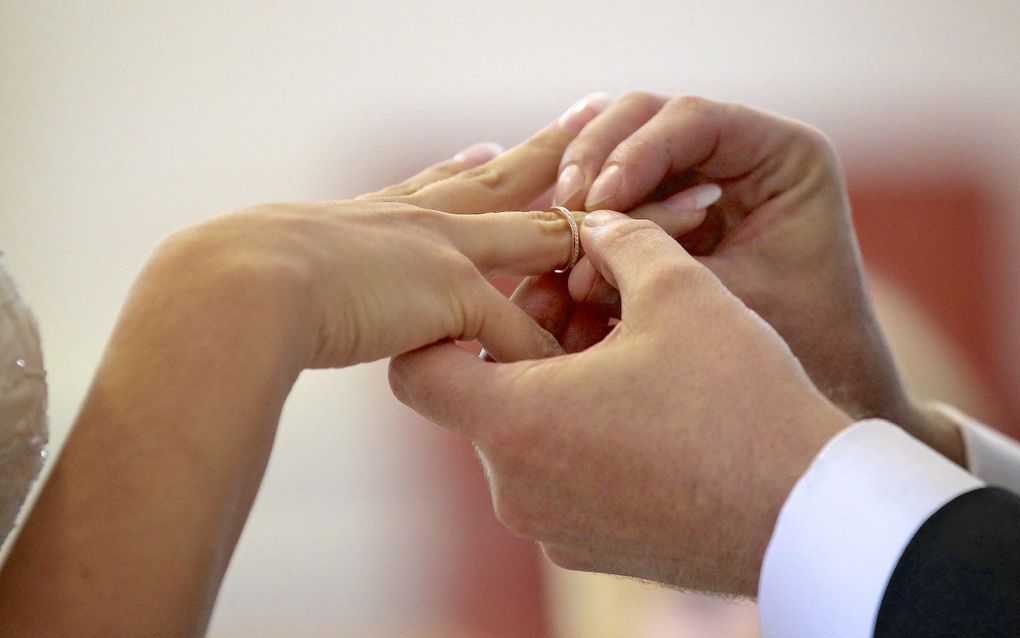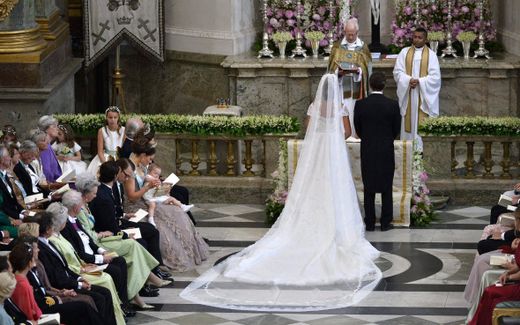Is polyamory the logical follow-up to marriage?

How elastic is marriage? Some people say, polyamory is the logical follow-up to marriage. Photo ANP, Levin den Boer
Opinion
Is it wrong for the church and government to restrict marriage to two people? It might sound like an odd question, but a Swedish theologian recently called this outright discrimination.
By only blessing relationships of two people, the church excludes a whole group of “polyamorous brothers and sisters”. And that divides the body of Christ, said Linda Landström in June in the Swedish church magazine Kyrkans Tidning.
Polyamory is having several relationships at the same time. From a distance, it looks a bit like polygamy, but it is different. It can be a group marriage of three or more people who all love each other. In a polygamous relationship, one man is married to several women, but the women do not love each other romantically.
Landström reacted with her article to an announcement by two pastors in Malmö. They had declared that they would open their church, especially to polyamorous people during the Pride weeks. Because these people are also part of the colourful rainbow, they argued.
Church is ahead
What is happening here is, of course, remarkable. The Church of Sweden is not behind the innovations, as most churches are, but ahead of them.
What surprises me the most is that the two clergymen, Helena Myrstener and Gunilla Hallonsten, refer to Ephesians 5, where Paul compares the relation of man and wife with Christ and the church. “It symbolises Christ’s covenant of love with his church.” I find that very aptly summarised. Paul connects marriage to the doctrine of Christ there. In other words, this is not a mediocre peripheral issue but goes to the heart of the Gospel.

Myrstener and Hallonsten praise this teaching because, for centuries, this has made people dream of the one and only. But now, “plurality” has made the longing for the one and only disappear. One would expect the church would see this plurality as sin, referring to that “love covenant of Christ”, but it does not.
If people long for plurality, they must assume that God has put that longing in them. Landström explained this again in an article this month. That is why the church opens its doors when the rainbow flags pass through the streets. To listen. And to bless. Because these theologians know beforehand that God has created a “rich diversity”.
Glory of Christ is at stake
I am ready to assume that many people are open to multiple relationships. It might even be so that most men would be available to this if they were sincere. But the question is whether this is to their honour. It seems to me that the church should not offer a platform to this but instead say that no less than the glory of Christ is at stake here and that repentance is necessary.
When I hear such a plea for polyamory, I am too common and too average to take this really seriously. People do not become happy by giving in to lusts and impulses but rather by curbing them. It’s like smoking; at the beginning, it seems excellent, but later, you see that it only causes damage.

That is why I was pleasantly surprised to see a completely different article in Sweden last week. In the newspaper Dagen, Sofia Rhedin told how she ended up in a kind of commune in the early 1970s. There she could draw and paint to her heart’s content, which she loved. And besides, that group was a paradise for free love.
The beginning of her life in that community was great. But soon, it changed. Sharing her intimacy with most of the group meant the end of intimacy itself. She could no longer enter into deep relationships. By the time she was 25, she could hardly lead an everyday life. Eventually, this brought her to Jesus. About that life’s journey, she has written a book.
Debate creates political questions
Rhedin’s story confirms to me that polyamory is not the way forward. It does not lead people to their ultimate purpose. When I read an interview like that, I can only say that I hope the theologians in Malmö will also read that.
Fact is that the Swedish people’s church is –more than in other countries, I guess– still somewhat part of the conscience of society. Politicians will feel stimulus to answer if the debate about polyamory gets a place in that church. If some clerics say that God has made people like this, why should the state not legislate for this? Indeed, good question.
For that reason, it was good to see that Kyrkans Tidning also gave a voice to Stefan Gustavsson, director of the apologetic society Apologia. For him, it is clear that monogamy is God’s purpose with creation. “This is confirmed by Jesus”, he says. He is not impressed by the cases of polygamy in the Old Testament. “There is nothing positive about polygamy according to the Bible.”
Gustavsson thinks that the limitation of two partners is “in the nature of love. All great love literature is directed at a single person, with each additional party a threat to the relationship. There is no great love literature that glorifies polyamory”, he says.
Also, in the comments below the article, there is fundamental criticism. Bob says: “God’s will is expressed in [His] revelation, not in our fleeting emotions.” And Per: “So, if your inclinations and desires are only strong enough, then it is right... This is not a decent way of thinking.”
It won’t remain quiet
My country, The Netherlands, was the first to open marriage to people of the same sex. After this, some people have said that a group marriage was the logical next step.

Until now, it has always been relatively quiet in this area. The only thing is that there has been a policy exploration of multi-parenthood related to polyamory.
Question is: will it stay quiet? I do not think so. The guiding principle for the opening of marriage was self-determination. And that has been leading since in everything around marriage and family. People decide for themselves what their love life is, and all the other views have to be called discrimination. Working from that principle, it is very difficult to challenge polyamory. And therefore, we can be sure that, sooner or later, the political debate about group marriage will come.
Related Articles







